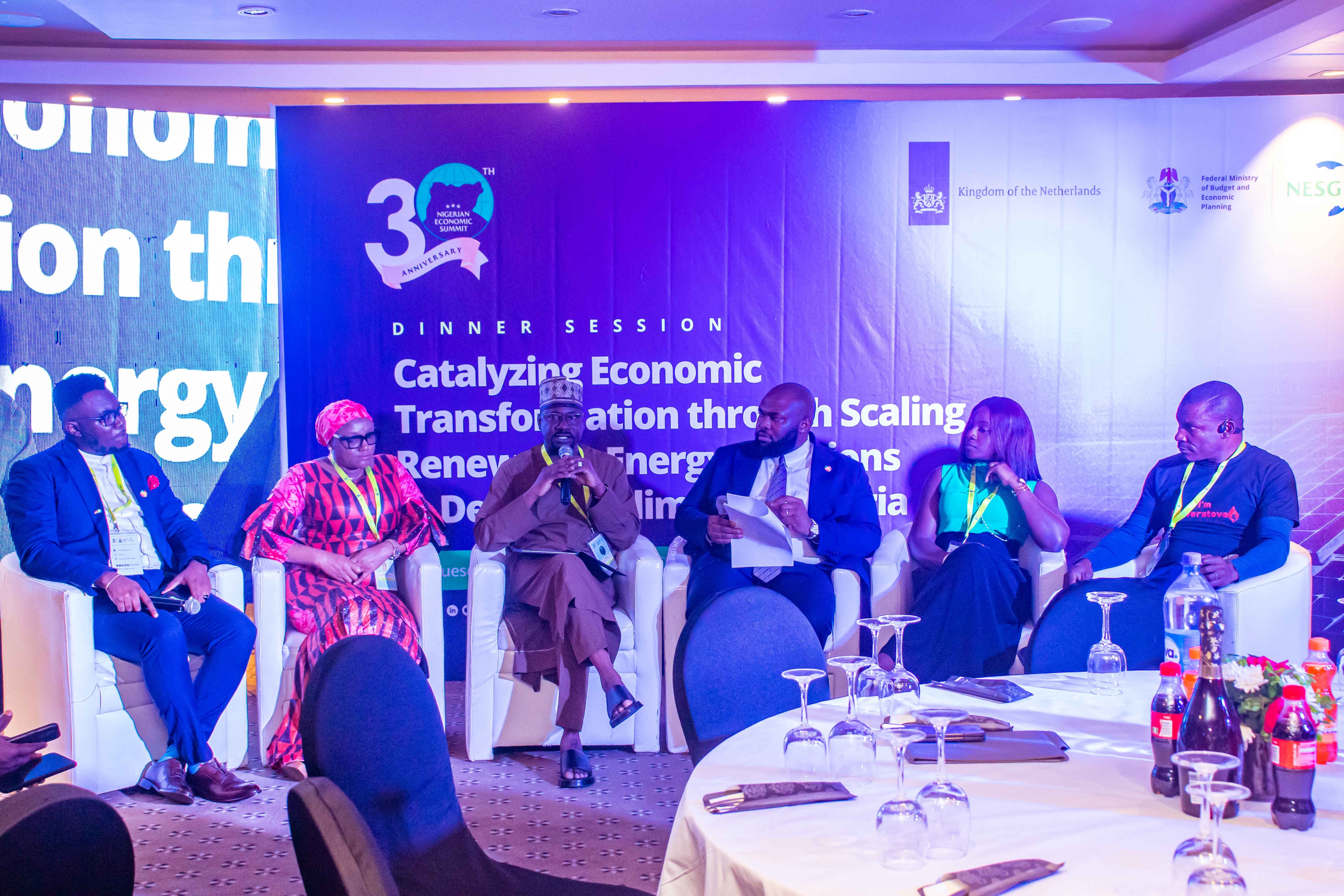Partnering for Progress: Netherlands and Nigeria Drive Renewable Energy Solutions - Nigeria
Partnering for Progress: Netherlands and Nigeria Drive Renewable Energy Solutions
At the 30th Nigerian Economic Summit (#NES30), the Netherlands hosted a side event to discuss scaling renewable energy solution to catalyze economy growth.
On October 15, 2024, at the 30th Nigerian Economic Summit (#NES30), the Netherlands convened a side event titled, "Catalyzing Economic Transformation through Scaling Renewable Energy Solutions in Deprived Climes in Nigeria," bringing together key perspectives from the renewable energy sector to explore sustainable solutions for underserved regions . Guided by Renewable Energy Specialist David Arinze, the session provided a platform for discussing clean energy initiatives and the vital role they play in driving Nigeria’s sustainable development.
Dr. Segun Adaju of the Nigerian Economic Summit Group (NESG) set the scene, stressing the pressing need for affordable, scalable energy solutions. With roughly 100 million Nigerians lacking access to reliable power, extending the national grid to rural areas—at a cost of $6,000 to $30,000 per kilometer—is unsustainable. He emphasized the promise of alternative solutions such as mini-grids and solar home systems, which offer renewable energy in a cost-effective, and environmentally friendly way.
In his keynote address, Consular General Michel Deelen of the Netherlands underscored the role of renewable energy in promoting sustainable economic growth in Nigeria. Deelen highlighted the Netherlands’ extensive experience in solar energy and stressed that clean energy is crucial in reducing reliance on costly fossil fuels, which are increasingly out of reach for rural communities. Solar energy, he noted, holds the potential to drive agricultural productivity, improve clean cooking options, and sustainably power underserved regions.
Nigeria’s Special Adviser to the President on Energy, Olu Verheijen, echoed these sentiments, calling for a stronger commitment to clean energy solutions through public-private partnerships. She shared insights from Shimankar Community in Plateau State, where mini-grid solutions have powered economic activities and improved the quality of life—demonstrating that clean energy is an essential pathway to rural development.
Panelists, including Abba Abubakar Aliyu of the Rural Electrification Agency (REA), Okey Esse of Powerstove Limited, Chimereze Nwosu of GIZ Nigeria, Habiba Ali of Sosai Renewables, and Ms. Susan Essien from SNV Netherlands Development, discussed ways to advance sustainable energy access. Aliyu highlighted the REA's aim to electrify 17.5 million Nigerians through renewable mini-grids and solar systems, while Esse shared Powerstove’s innovative pay-as-you-cook model, designed to overcome financial barriers to clean cooking. Ali stressed the importance of gender-inclusive policies and funding models.
Essien explained how the Netherlands-funded Nigeria Solar Marketplace (SMP) connects demand and supply within Nigeria's solar sector, thereby enhancing accessibility to quality solar solutions by linking suppliers, financiers, and consumers to clean energy options. She highlighted the difficulties consumers face when trying to identify credible solar providers and purchase quality solar products, especially as demand for solar grows, as well as the need for increased investment in the sector. She described how the Solar Marketplace addresses these challenges by facilitating business, trade, and investments between local and foreign actors in Nigeria’s solar sector and serving as a resource hub for market intelligence. She also emphasised the partnerships being established with local and international solar businesses through the Marketplace and outlined plans to scale up its offerings to both businesses and consumers.
Key recommendations from the session included the need for policies that streamline renewable energy regulations, the mobilization of local financing through sustainable funds, and enhanced public-private partnerships to manage risks and drive project scale-up. Panelists also highlighted the importance of training local developers and utilizing technology to improve service delivery.
The event concluded with a strong consensus for collaboration among government, private sector, and international partners to scale renewable energy solutions in Nigeria . Only working together can clean energy access be scaled across Nigeria, creating economic opportunity while preserving environmental health. The NESG was called upon to play a critical role in shaping the policy environment and supporting the necessary reforms to achieve these goals.
Visit the Nigeria Solar Market Place for more information.

